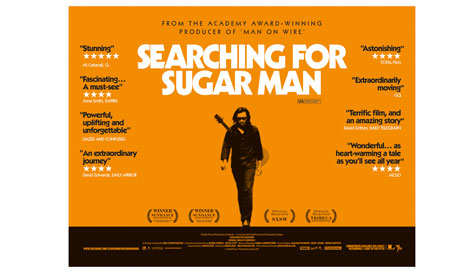Review of Searching for Sugar Man, directed by Malik Bendjelloul
By CHRISTIAN HAMAKER
This September, a singer from Detroit performed “a charming and awesomely odd show”—his first in the Washington, D.C., area in many years. It was a wonder he attracted a paying audience, given his relative obscurity and advancing years, and the fact that, even in his heyday, he never had much of a U.S. following.
 But the performer, Sixto Rodriguez, has been recently rediscovered in America thanks to Searching for Sugar Man, a documentary that continues to pull in consistent grosses while playing in very limited release. After six weeks, the film was approaching $1 million in receipts, despite having never played in more than 33 theaters.
But the performer, Sixto Rodriguez, has been recently rediscovered in America thanks to Searching for Sugar Man, a documentary that continues to pull in consistent grosses while playing in very limited release. After six weeks, the film was approaching $1 million in receipts, despite having never played in more than 33 theaters.
Why the interest in Rodriguez? Because his story is not just a tale of overdue recognition of artistic talent, but a triumph—of sorts—over death. Not physical death, but the death of an artist, the kind suffered when expectations aren’t met, when products don’t sell, and when changing tastes and business realities chew up and spit out musicians, bringing an (often premature) end to their careers.
Rumors of Rodriguez’s demise—accepted and assimilated into Rodriguez lore—didn’t help. Described in the film as “the most grotesque suicide in rock history,” Rodriguez was rumored to have killed himself on stage. But—and this is worthy of a SPOILERS warning—Rodriguez is alive. He resides in Detroit, in the same house he’s lived in for decades. He’s a home renovator content with his line of work, and he has given away much of what he’s made off of his musical success—particularly in South Africa, where he’s sold hundreds of thousands of records.
The film wants us to admire Rodriguez, to root for his restoration, but I was never sure what to think of the man. Is he talented? Sure. Is he worthy of admiration and recognition by his peers and fans? Definitely. But “Searching for Sugar Man” hints at something more profound, more spiritual, in the person of Rodriguez.
Rodriguez is said to lead a simple life free of material concerns. The producer of Rodriguez’s second album describes the musician and songwriter as being “like a wise man, a prophet … way beyond just a musical artist.” When he plays his music, it’s “something transparent, something universal,” says an admirer of Rodriguez, and he challenges us to “ask yourself: Have you done that?”
The film depicts Rodriguez as untainted by the pressures of the music business, above material concerns, and a Messiah figure of sorts. Have we done what he’s done? Will we follow his example?
Watching the film, I found myself thinking about the written testimony of Christ, the historical witness that serves as the primary basis for our faith in Jesus. When people question Christ, they sometimes ignore the clear revelation of him that we find in Scripture. Or, perhaps more often, they question the validity of that testimony. But two centuries of such questions, whether they come from ancient heretics or today’s Jesus Seminar, have failed to make much of a dent in the growth of Christianity. We have reliable historical manuscripts that attest to Jesus’ life and his claims about himself.
Sixto Rodriguez made a couple of records and then dropped out of sight. He had a few fans. Despite his popularity overseas, Rodriguez was living below the radar in the United States, with many fans assuming he was long dead. The film doesn’t indicate that this belief was deliberately sowed by Rodriguez, who seems oblivious to the controversy and content to leave that part of his life behind him.
However, his fans won’t let him be. He continues to find favor with a new generation of admirers. As an artist, that has to be gratifying. I wish him well, and am glad to see his talent recognized and praised. But Searching for Sugar Man left me thinking about much bigger things—much more important things—than the life and reputation of a songwriter. I’m not sure that’s exactly what the filmmakers had intended, but I’m glad that Rodriguez’s story stimulated such thoughts as I watched the film, and, even more so as I reflected on it.












